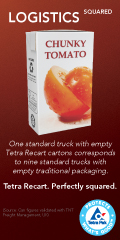CLFP Insider
California League Of Food Producers
Feature Column
Mechanization is an integral part of today’s food processing industry. Machines have streamlined every aspect of the business but, in turn have created opportunity for injured workers. A critical component of operating equipment safely is having a robust lockout/tagout/blockout program.
Visit https://www.naylornetwork.com/cfp-nwl/articles/index.asp?aid=195574&issueID=26122 to view the full article online.
Capitol News
Proposition 37 will be on today's General Election ballot. This measure is opposed by CLFP. It would ban the sale of tens of thousands of perfectly-safe, common grocery products only in California unless they are specially repackaged, relabeled or remade with higher cost ingredients.
Visit https://www.naylornetwork.com/cfp-nwl/articles/index.asp?aid=196128&issueID=26122 to view the full article online.
Regulatory Insights
As we all know by now, Governor Brown’s Proposition 30 would temporarily increase the state sales tax rate for all taxpayers and the personal income tax (PIT) rates for upper-income taxpayers. It does this by increasing the state's sales tax (already about the highest in the country with rates over nine percent depending on local jurisdiction) by one-quarter cent for everyone for four years.
Visit https://www.naylornetwork.com/cfp-nwl/articles/index.asp?aid=195927&issueID=26122 to view the full article online.
As if the warnings from the Emissions Monitoring Assessment Committee (EMAC) pointing out a number of serious cap-and-trade vulnerabilities weren’t enough, as well as the continuing glitches in the CITSS registration process, now Mother Nature is sending tendrils of uncertainty into CARB’s efforts to ensure a successful cap-and-trade auction on November 14 in that Hurricane Sandy has further complicated the bid guarantee process for the auction.
Visit https://www.naylornetwork.com/cfp-nwl/articles/index.asp?aid=195979&issueID=26122 to view the full article online.
CLFP News
Food Processing Expo 2013
Implementing SQF - Version 7 post-harvest
Produce GAPs Harmonized Standard/Audit Training
GLOBALG.A.P. Version 4 - Crops Base - Fruits & Vegetables
Implementing SQF - Version 7 post-harvest
Produce GAPs Harmonized Standard/Audit Training
GLOBALG.A.P. Version 4 - Crops Base - Fruits & Vegetables
Visit https://www.naylornetwork.com/cfp-nwl/articles/index.asp?aid=195576&issueID=26122 to view the full article online.
Announcements
Legend has it that California discovered the commercial potential of raisins quite by accident. In 1873, a freak hot spell withered the grapes on the vine. One enterprising San Francisco grocer advertised these shriveled grapes as "Peruvian Delicacies" and the rest is history. In 1876, Scottish immigrant William Thompson grew a seedless grape variety that was thin skinned, seedless and sweet. Today over 90 percent of California raisins are made from Thompson seedless grapes and half the world’s supply of raisins are grown in California.





